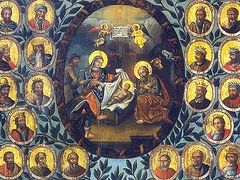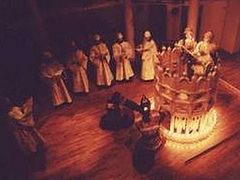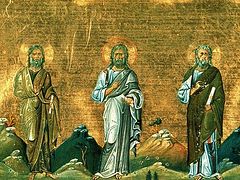 Photo: stephenmorrisauthor.com Among the saints commemorated two weeks before the Nativity of Christ, I would like to draw your attention to the Prophet Daniel and the three young men who were cast into the fiery furnace for refusing to worship idols.
Photo: stephenmorrisauthor.com Among the saints commemorated two weeks before the Nativity of Christ, I would like to draw your attention to the Prophet Daniel and the three young men who were cast into the fiery furnace for refusing to worship idols.
Regarding the Prophet Daniel, I want to say just one thing: He was thrown to the wild beasts because he refused to spend even a single day without prayer. He chose to risk his life rather than do something that so many people do so easily every day—neglect worshiping God, fail to praise His name, fail to express faithfulness to Him, and fail to offer intercessory prayer for others before His throne. For Daniel, even to save his life, it was unthinkable to abandon these acts of devotion. This is something for us to reflect upon.
As for the three young men who were cast into the fiery furnace, I want to highlight two points. First, they were willing to be burned alive rather than worship the idol of the king—an image of earthly power—and to turn away from God to serve earthly values. Do we not often do the same, day after day, by submitting to every command of the world, serving all its earthly values, and choosing a safe life over the risk of being a child of God?
Second, every revelation of human holiness, of the greatness of the human spirit, and of boundless devotion to God by people like us is always accompanied by a revelation of God Himself. The three young men refused to worship the idol and were cast into a furnace so hot that it burned those who approached it. The tyrant king, curious to see their suffering, drew near to the furnace and asked his advisors: Did not we cast three men bound into the midst of the fire? How is it that I see four men loose, walking in the midst of the fire, and they have no hurt; and the form of the fourth is like the Son of God?”(Daniel 3:24–25). In response to the faithfulness of the three young men, Christ the Savior descended into the furnace before His incarnation, appearing in the glory of His divinity in human form. He freed them from their bonds, delivered them from death, and glorified them in the presence of the tyrant king and his followers.
What does this event tell us about God? It tells us that where there is suffering, where the flames of temptation burn, and where the terror of death grips people—God is among them. He is not a distant deity calling them to endure suffering that He Himself would not bear. He does not save from the outside, without participating in their suffering. Our God descended into our midst, taking on everything that defines the human condition. He endured the fiery trial and prevailed. In the midst of these fiery trials, He grants freedom to those who remain with Him. He descended into the depths of human hell and there proclaimed freedom, God’s victory, and new life for humanity.
How can we not bow down before such a God? How can we refuse to serve Him? How can we prefer any other values to those of God and Christ on earth, or submit to any other authority than Christ’s?
Let us also reflect on this: The day of Christ’s Nativity is approaching—how will we receive Him? On this day, He descends to earth, enters the limitations of creation, steps into the brokenness of a fallen world, and plunges into the depths of sin while remaining sinless—all out of love for us.
Will we find the generosity to respond to His love with our own? Will we find the courage, like Daniel, the three young men, and countless saints, to answer His call to become God’s people? When we look at the calendar of saints, we are struck by phrases like, “Saint so-and-so, with his wife and two children,” or, “Saint so-and-so, with his brother and such-and-such number of friends.” These friends, brothers, and spouses numbered in the thousands. They were like us—fragile, afraid of pain, and longing to live. But they chose faithfulness to love over betrayal, even in small things, and so they became capable of being faithful in great things.
Let us begin with small things. Let us be faithful to God in everything that is within our small strength. In doing so, we will grow to the stature of those who were faithful in much and entered into the joy and glory of their Lord. Amen.



